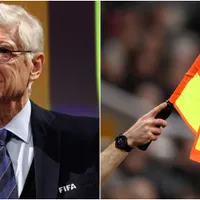The International Football Association Board (IFAB) and FIFA recently concluded its 2024 meeting in London, addressing pressing concerns within the soccer world. Technology took center stage, with significant progress made on several initiatives designed to improve the game’s dynamism and fairness. The optimistic tone of the meeting significantly increases the likelihood that these rule changes will be officially implemented in March 2025, in Belfast.
The IFAB moved closer to finalizing a revised Video Assistant Referee (VAR) system. This new system allows coaches to initiate VAR reviews, replacing the current process where reviews are primarily initiated by match officials.
This shift aims to make VAR technology more accessible and affordable for leagues and tournaments with limited budgets. By empowering coaches to request reviews, the IFAB hopes to streamline the process and reduce costs associated with traditional VAR operations.
Concerns regarding excessive time-wasting have prompted the IFAB to introduce two measures aimed at improving the flow of the game:
- Designated Captain’s Area: A designated area for captains to communicate with referees is proposed. This aims to prevent crowding and facilitate more orderly and respectful communication. While this rule has been implemented in some leagues, enforcement has been inconsistent.
- Stricter Rules on Goalkeeper Time-Wasting: The IFAB proposes stricter regulations for goalkeepers to prevent time-wasting tactics. An eight-second countdown will be enforced, with potential penalties such as corner kicks or throw-ins from the sidelines, depending on the referee’s judgment.

Enhanced transparency in refereeing decisions
The IFAB also aims to improve transparency in refereeing decisions, proposing several measures to increase understanding among players, coaches, and viewers:
- Live VAR Announcements: Live announcements will explain VAR decisions to the public, enhancing transparency and improving the overall understanding of the game. While FIFA has used this in tournaments like the Club World Cup and some federations use it in crucial moments, this would be a significant step for worldwide adoption.
- Semi-Automated Offside Technology: The IFAB is advancing the implementation of more precise and faster semi-automated offside technology to reduce errors and increase efficiency. While limited in its current use, it will help expedite decision-making in tight offside calls.
- Body Cameras for Referees: The use of body cameras on referees, while not impacting real-time gameplay, offers valuable material for referee training and analysis. This aims to improve consistency and understanding of refereeing decisions.
The IFAB’s decisions represent a significant step forward for the future of football. With the strong likelihood of final approval in Belfast, these technological improvements and rule changes will shape the game in 2025 and beyond. The changes are intended not only to improve the accuracy and consistency of officiating but also to enhance the overall viewing and playing experience.















